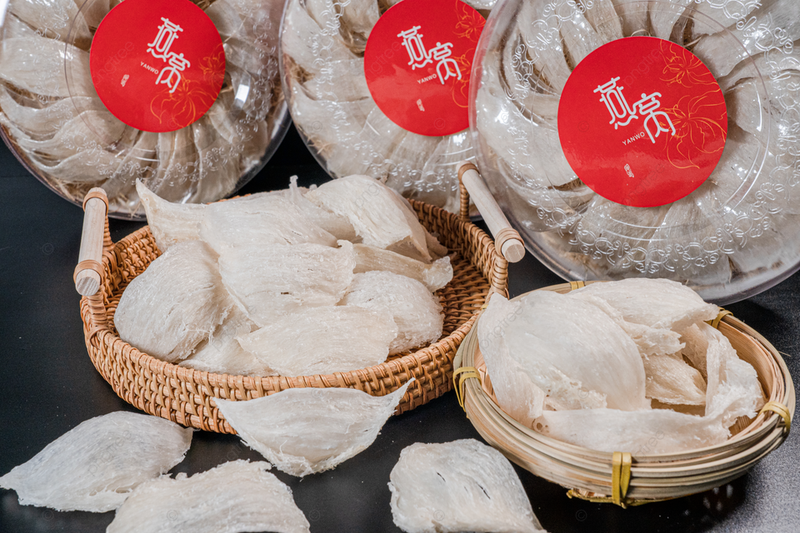Bird’s nest is extracted from the nests of swiftlets, containing protein, amino acids and essential minerals, helping to nourish the body and increase resistance. The following article will let you know the effects of bird’s nest and notes when using it.
Bird’s nest not only helps nourish the body but also supports the immune system, aids digestion…. However, not everyone knows how to use bird’s nest properly to achieve optimal results. In this article, we will explore in detail the effects of bird’s nest on health and important notes when using it to ensure safety.
Characteristics of bird’s nest
Bird’s nest, usually ranges in size from 8 – 10cm, with the shape of an upside-down cone. Although usually pure milky white, some bird’s nests can appear in different colors, reflecting the richness of minerals and nutrients available inside.

Bird’s nest is often a valuable dish in Asian countries such as China, Singapore,…
Not only is it a luxury dish, bird’s nest also brings high economic value, especially in Asian countries such as China, Hong Kong, Malaysia, Singapore. People often use bird’s nest in many sophisticated dishes such as soup, porridge, or fruit juice, and can even enjoy it directly.
After harvesting, bird’s nest needs to be carefully processed. Impurities on the bird’s nest will be removed by washing and drying. With the support of modern technology, this process is becoming more and more effective, preserving the valuable nutritional content of bird’s nest.
After being pre-processed, bird’s nest will be stored in dry bags or special boxes, ensuring optimal temperature and humidity conditions. In particular, fresh bird’s nest can be stored in the refrigerator, helping to prolong the shelf life while still preserving the flavor and nutrition.
The effects of bird’s nest on overall health
In bird’s nest, people find a series of essential vitamins and minerals such as vitamins A, E, D, along with important minerals such as iron, calcium, zinc, magnesium, selenium, cobalt and phosphorus. These components not only play an important role in maintaining health but also support many body functions.

The health benefits of bird’s nest are due to the amino acid content and flavonoids in bird’s nest.
In addition, bird’s nest also contains natural sugars such as fructose, glucose, mannose and raffinose, providing an abundant source of energy for the body. In particular, antioxidants such as flavonoids, carotenoids and vitamin E.
From there, we can see the effects of bird’s nest as follows:
Improve cardiovascular health
The first effect of bird’s nest that needs attention is on cardiovascular health. Because bird’s nest contains a high proportion of unsaturated fatty acids, this is very beneficial for cardiovascular health. Research by Lee et al. (2019) shows that bird’s nest has the ability to reduce serum cholesterol, prevent atherosclerosis and heart-related problems.
In addition, there is research that bird’s nest also effectively supports in reducing the risk of cardiovascular disease due to estrogen deficiency in mice (Hou et al., 2015). The mechanism of action of bird’s nest is similar to simvastatin, through regulating the transcription of genes involved in blood clotting (Zhang et al., 2015).
Improve vision
A 2011 study on rabbits showed that bird’s nest has the ability to improve vision. Bird’s nest stimulates the production of fibroblasts, thereby helping the eyes to be brighter and healthier.
Strengthen the immune system
The effect of bird’s nest on the immune system is demonstrated through the activity of B lymphocytes, which are cells responsible for producing antibodies. A study on mice showed that the protein in bird’s nest promotes the production of B cells, strengthening the immune system.
Strengthen bone and joint health
Bird’s nest is a rich source of calcium and phenylalanine, which helps strengthen bones and prevent bone and joint diseases such as arthritis, osteoarthritis, and osteoporosis. In addition, the ingredients in bird’s nest also support the regeneration and repair of cartilage damage, helping joints function more smoothly.
Support health recovery
Bird’s nest is rich in iron and protein, helping to increase blood volume in the body. These substances stimulate red blood cell regeneration, support blood production and hemoglobin synthesis, thereby improving the ability to transport oxygen to cells.
In addition, with many other vitamins and minerals in bird’s nest, it is very suitable for people who need to replenish blood and restore health after illness, postpartum or post-surgery.
Support weight loss
With a high content of the amino acid methionine, bird’s nest helps eliminate excess fat accumulated in the body, bringing a firm and slim figure. Therefore, thanks to the effect of bird’s nest in supporting weight loss and maintaining weight, it also supports well in cases where weight needs to be monitored in lipid disorders or diabetes.

Bird’s nest is mostly prepared by steaming with many other ingredients to improve health.
What should you pay attention to when using bird’s nest?
According to Oriental medicine, bird’s nest is known for its sweet taste, neutral properties, non-toxicity, and direct impact on the body’s three important meridians: the Lungs, Stomach, and Kidneys. Bird’s nest is often used to support the treatment of diseases such as body weakness, prolonged cough, coughing up blood, asthma, vomiting blood, stomach pain, or chronic dysentery.
When using bird’s nest to improve health, it is especially important to note that it should not be used for people with lung and stomach deficiency, phlegm stagnation, or external diseases such as colds and fevers. In these cases, bird’s nest not only cannot exert its tonic effect, but can also make the condition worse.
To take advantage of the effects of bird’s nest most effectively, it is advisable to apply the gradual tonic method, which Oriental medicine calls “delayed tonic”. That is, to nourish with small doses of 6 – 10g and for a long time. Although bird’s nest is very rich in nutritional value, if the body does not absorb all the nutrients, it can cause cold stomach or diarrhea, because bird’s nest is cold. Therefore, using bird’s nest requires perseverance for a long time to be able to see all the effects of bird’s nest.

Bird’s nest should not be used by people with cold lung and stomach deficiency, phlegm and dampness stagnation.
Thus, the above article has provided you with information about the health benefits of bird’s nest and precautions when using it. However, to maximize the benefits of bird’s nest, you need to understand how to use the correct dosage and avoid using it in inappropriate cases such as when the body is suffering from a cold or has a weak constitution.





